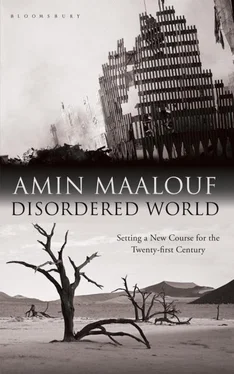But however much faith we place in leaders who meet in groups of two, seven, eight or twenty, with their hosts of competent advisers and reassuring press conferences, we still have to admit that every shock to the system is generally followed by another, more serious one. And this gives the impression that the previous response must have been inadequate.
After a certain number of slumps, one comes to the inevitable conclusion that this disparity is due not to misjudgements, but to the fact that the global economic system is more and more impervious to control. This is a failing which cannot be ascribed to a single cause, but it is certainly in part explained by a characteristic of our time which can be seen in numerous other fields: the fact that problems can only be solved by thinking globally, as though the world were a single, plural nation, whereas our political, legal and mental structures constrain us to think and act according to our specific interests — those of our states, electorate, businesses and national finances. Every government is inclined to think that what is good for it is good for everyone else. And, even if it is sufficiently clear-sighted to realise that this is not always the case, and even if some of its policies — protectionism, quantitative easing, discriminatory legislation and currency manipulation — have a negative impact on the rest of the world, it will nonetheless suit itself in its attempts to escape from stagnation. The only limit on the sacrosanct selfishness of nations is the necessity to avoid the collapse of the whole system.
This is a new kind of balance of terror which has been established, notably between the Chinese and the Americans — ‘If you try to ruin me, I’ll drag you down with me.’ It is a risky game that leaves the planet at the mercy of a slip-up, and is no substitute for true solidarity.
Equally worrying is the fact that the economic turbulence that we see today has its origin in multiple types of disorder which affect the world and which come from both inside and outside the financial sector. Thus there are — alongside the data which allow the prediction that one year will see an economic slowdown and the next an upturn — many other factors whose effects cannot be reasonably predicted.
For example, extreme fluctuations in oil prices are due in part to speculation, but they are also influenced by the growing needs of the great nations of the South, and by political uncertainty in regions where oil is produced and across which it is transported — such as the Middle East, Nigeria, the Sahara, the Black Sea and the former Soviet Union — as well as several other factors. In order to control these fluctuations and prevent them from destabilising the wider economy, measures would probably have to be taken to discourage speculation at a global level. But there would also have to be concerted and equitable management of the planet’s resources, changes in production and consumption methods, an end to the after-effects of the Cold War in improved relations between Russia and the West, and solutions found to a range of regional conflicts. That gives some indication of the scale of the problem, which demands a high degree of active solidarity between nations and which would take decades to achieve. Meanwhile the turbulence is affecting us today.
As soon as a government tries to tackle a problem, it finds that this problem is linked to a hundred others which belong to different areas and escape its influence. Whether it is fighting against recession, inflation and unemployment, or pollution, drugs, pandemics or urban violence, it inevitably comes up against problems of all sorts — geopolitical, sociological, sanitary, cultural or moral — which originate in all corners of the planet; problems which absolutely have to be solved if it is to have any chance of success, but on which it can get little or no purchase.
In economics it has long been acknowledged as a matter of common sense that if everyone acts according to his own interests, the sum of those actions will be beneficial to the general good. Selfishness would thus be paradoxically the truest form of altruism. According to Adam Smith, every individual ‘by pursuing his own interest … frequently provokes that of the society more effectually then when he really intends to promote it.’ Writing in the eighteenth century, he also talked of an ‘invisible hand’ which would providentially harmonise the economic machine without the need for any authority to intervene. It is a highly controversial vision, of course, but not one that can be easily dismissed, given that it is at the heart of the most successful economic system in human history.
What we do not yet know is whether this ‘invisible’ hand is still capable of operating today, if it is able to ‘lubricate’ a global market economy, combining societies with different laws and innumerable individuals worldwide acting in unforeseeable ways as it used to be able to do for a few countries in the West. It is probable in any case that no invisible hand could prevent the growing wealth of nations weighing heavily on the resources of the planet or polluting the atmosphere, but neither is it certain that the visible hands of our leaders are any better equipped to manage our global realities.
In the space of a few years we have seen two opposing belief systems thoroughly discredited. First, state power was stigmatised. In the wake of the failure of the Soviet system, all forms of planned economy seemed like heresy, even to some socialists. The laws of the market were deemed to be wiser, more effective and more rational. Almost everything was reckoned to be ripe for privatisation: health care, pensions, prisons and even, for the neo-conservatives in the White House, defence. The idea that the state had a duty to assure the well-being of its citizens was challenged, often implicitly, but sometimes explicitly. The principle of equality even came to be considered obsolete, a relic of a bygone age. There was felt to be no reason to be ashamed of flaunting disparities in wealth.
But the pendulum had swung too far and struck the wall, which sent it back in the opposite direction. Now belief in the infallibility of the market has been stigmatised. The virtues of the role of the state have been rediscovered. There have even been massive nationalisations, despite some distaste at using that word. Certainties which have been constantly trumpeted for three decades have been shaken and a radical reappraisal is under way, which will affect the political, social and economic spheres and will probably go far beyond that. How can a major financial crisis be resolved without attacking the crisis of confidence that accompanies it, the distortion in the scale of values, the loss of moral credibility of leaders, states, companies, institutions and those who are supposed to regulate them?
One of the most striking images from the first decade of this century was of Alan Greenspan, former director of the Federal Reserve Board, testifying to a congressional committee in October 2008. Though he denied that the decisions he had taken, or failed to take, in the course of his eighteen-year reign could have been responsible for the cataclysm in the US sub-prime market and the ensuing global turbulence, he admitted that he was in a state of ‘shocked disbelief’. He was convinced, he said, that lenders would never act in a manner which would compromise the interests of their own shareholders. ‘This modern risk-management paradigm held sway for decades. The whole intellectual edifice, however, collapsed in the summer of last year.’
I suppose that those who doubt the inherent wisdom of the mechanisms of the market will have responded to these words with sarcasm. But what Greenspan expressed was not just the disappointment of a misguided conservative. If his remorse strikes me as significant, even touching, it is because it marks the end of a period in which the behaviour of economic agents had coherence and decency and obeyed certain rules; in which big-spending, predatory and fraudulent leaders were rare; and in which one could depend on certain values and instantly recognise healthy businesses.
Читать дальше












